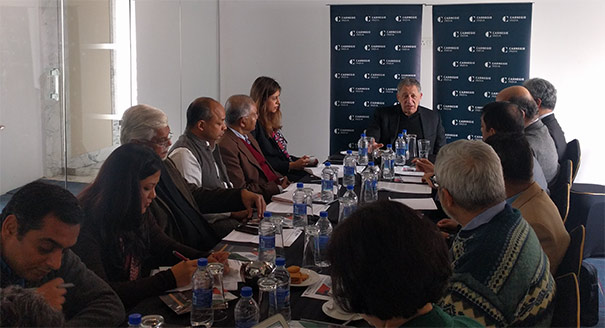Registration
Thank you!
You will receive an email confirming your registration.
The election of Donald J. Trump as the new president of the United States of America has led to a intense discussion across the world, including in India, about the conditions that enabled his rise, the future of American diplomacy, and potential shifts in geopolitics. In order to discuss these issues and their relevance to India, Carnegie India hosted David Rothkopf, visiting scholar at the Carnegie Endowment as well as CEO and editor-in-chief of the FP Group, for a private roundtable with eminent Indian journalists, analysts, and commentators.
DISCUSSION HIGHLIGHTS
- Global Trends: Rothkopf argued that the election of Donald Trump is emblematic of a larger global shift in politics, especially in the advanced economies. This shift is a manifestation of reactionary impulses in these countries that seek to stall changes that cannot be stopped. He explained that these changes are of two types: slow, demographic transitions and rapid, technology-driven transformations. Discussants laid particular emphasis on the disruptive influence of emerging technologies, and argued that it would have a particularly strong impact on both warfare and society.
- Effect of Technological Changes on War: Technologies such as autonomous weapons and drones will dramatically reduce the cost of military action, discussants said. It will become increasingly feasible for countries to engage in low-intensity conflicts. Further, they added, given these changes, the nature of the arms race will change with availability of capital and technology determining its outcome. Rothkopf pointed out that given India’s technological base, it currently has an edge in this race.
- Effect of Technological Changes on Society: New and emerging technologies will drive social transformations, discussants said. The ability of leaders to reach out to citizens directly through social media will undercut the importance of traditional political institutions like political parties. Further, the use of social media as the primary source of information and news will create a double echo chamber, with two sets of editors at play: first, traditional news journalists, and second, an individual’s social media circle. Here, participants highlighted the issue of a possible digital divide emerging. This division between the digital haves and have-nots is at the heart of current political changes, including the election of Trump, and will remain a major issue going into the future. Rothkopf argued that a new philosophical, social, and political paradigm is needed to enable societies to cope with these changes and issues.
- America’s External Relations: In the 20th century, the United States had a ‘special relationship’ with the United Kingdom and Israel. Rothkopf argued that in the 21st century, this special relationship will be with India and Australia. This is primarily because the only way to counter China’s rise is through a new geo-political alignment between the United States, India, Japan, and Australia. Further, Rothkopf asserted that there is no cold war between the United States and China, unlike the zero-sum game that existed between the United States and the Soviet Union. China and America are interconnected to a great extent and will continue to remain so in the future, he concluded.
This summary was prepared by R. Shashank Reddy, a research assistant at Carnegie India.
